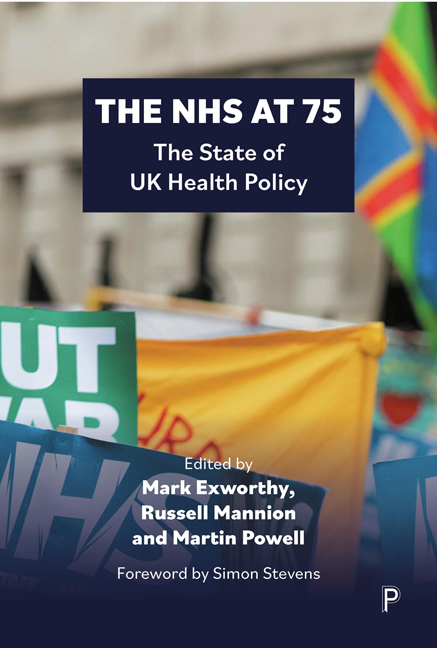Book contents
- Frontmatter
- Dedication
- Contents
- List of figures and tables
- Notes on contributors
- Foreword
- 1 The NHS at 75: an unfolding story
- 2 NHS governance: the centre claims authority
- 3 Health and care funding at 75
- 4 The devolved nations
- 5 NHS at 75: general practice through the lens of access
- 6 NHS hospitals and the bedpan doctrine: the first 75 years
- 7 Quality and the NHS: fair-weather friends or a longstanding relationship?
- 8 Improving health and tackling health inequalities: what role for the NHS?
- 9 NHS managers at a crossroads: part of the problem or the solution?
- 10 Forgotten, neglected and a poor relation? Reflecting on the 75th anniversary of adult social care
- 11 The NHS at 75 in comparative perspective
- 12 Our NHS? The changing involvement of patients and the public in England’s health and care system
- 13 After 75 years, whither the NHS? Some conclusions
- Index
6 - NHS hospitals and the bedpan doctrine: the first 75 years
Published online by Cambridge University Press: 03 April 2024
- Frontmatter
- Dedication
- Contents
- List of figures and tables
- Notes on contributors
- Foreword
- 1 The NHS at 75: an unfolding story
- 2 NHS governance: the centre claims authority
- 3 Health and care funding at 75
- 4 The devolved nations
- 5 NHS at 75: general practice through the lens of access
- 6 NHS hospitals and the bedpan doctrine: the first 75 years
- 7 Quality and the NHS: fair-weather friends or a longstanding relationship?
- 8 Improving health and tackling health inequalities: what role for the NHS?
- 9 NHS managers at a crossroads: part of the problem or the solution?
- 10 Forgotten, neglected and a poor relation? Reflecting on the 75th anniversary of adult social care
- 11 The NHS at 75 in comparative perspective
- 12 Our NHS? The changing involvement of patients and the public in England’s health and care system
- 13 After 75 years, whither the NHS? Some conclusions
- Index
Summary
Introduction
Since its inception NHS hospital management has been subject to the ‘bedpan doctrine’. Although no-one seems certain exactly when, Aneurin Bevan, the founder of the NHS, is often credited with saying that ‘If a bedpan is dropped on a hospital floor in Tredegar, I want the noise to reverberate in the corridors of the Palace of Westminster’. Essentially, the government is ultimately responsible for how NHS hospitals are managed or mismanaged. However, there are practical limits upon how far central government can actually anticipate or prevent politically awkward developments and events in NHS hospitals. The tension has existed for 75 years since but as we shall see some health policies exacerbate it. This chapter uses the bedpan doctrine as a framework for examining how the governmental balance between central control and local managerial discretion (see Chapter 1) has played out in NHS hospitals, especially since the 2008 financial crash, a watershed in UK economic development (Cribb and Johnson, 2018), including that of NHS hospitals.
What doctrine implies
Central control
A doctrine which attributes to government the ultimate responsibility for the state of NHS services appears to legitimate extensive government involvement in controlling NHS hospitals, an implication which ambitious or reforming policy-makers might welcome. However, the doctrine also implies that governments are also responsible for how NHS hospitals respond to adverse circumstances or events. In the last 75 years that has happened on a grand scale in three ways. One was, and is, the demographic shift. The proportion of UK population aged over 65 has slowly risen, from 16.0 per cent in 2001–02 to 18.6 per cent in 2019–20 (Office for National Statistics, 2022) with the well-known consequences of increasing demand on NHS hospitals, in particular ‘winter pressures’. Rising socio-economic inequality has similar consequences (Kivimäki et al, 2020). Another was the 2008–10 financial crash which was followed by a fiscal policy reversal from expansion to austerity. COVID was the third. Additionally, more transient problems have also recurred, including safety scandals, waiting times and strikes. Even when a government is guiltless in creating such problems, the bedpan doctrine still holds it responsible for making NHS hospitals implement a remedy, and culpable should they appear to fail. The bedpan doctrine may also motivate governments to conceal or massage information that might make them seem culpable.
- Type
- Chapter
- Information
- The NHS at 75The State of UK Health Policy, pp. 112 - 135Publisher: Bristol University PressPrint publication year: 2023



